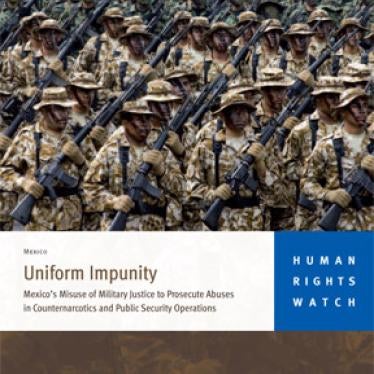Published in the Washington Post
The Aug. 13 editorial "Mexico's Drug War" asserted that it would be "counterproductive" for the United States to let human rights concerns hold up the release of funds to support Mexico's fight against drug cartels. In fact, the opposite is true.
Human rights abuses are a major obstacle to Mexico's efforts to strengthen public security and contain drug-related violence. By abusing civilians, Mexican soldiers have contributed to the climate of lawlessness and violence in which drug cartels have thrived. These abuses also deter the public cooperation essential to curbing trafficking.
The United States and Mexico agreed to include human rights conditions in the Merida Initiative to help correct this dynamic. But the Mexican government has yet to comply with key requirements, such as ensuring that civilian authorities investigate alleged army abuses.
Releasing the funds now would betray an important bilateral commitment to human rights and signal that the requirements weren't meant to be taken seriously. It would be a serious setback for Mexican efforts (begun by the Vicente Fox administration) to promote adherence to international human rights commitments and use them to leverage long-overdue reform.
It would also undermine the credibility of future U.S. efforts to promote human rights.
The bulk (85 percent) of Merida funds have already been authorized, so enforcement of these human rights requirements does not mean scrapping U.S. support for Mexico's fight against the cartels. Instead, it would make the use of those funds more effective.
JORGE G. CASTAÑEDA
Member, Board of Directors
KENNETH ROTH
Executive Director
Human Rights Watch
New York
Jorge G. Castañeda is a former foreign minister of Mexico.







